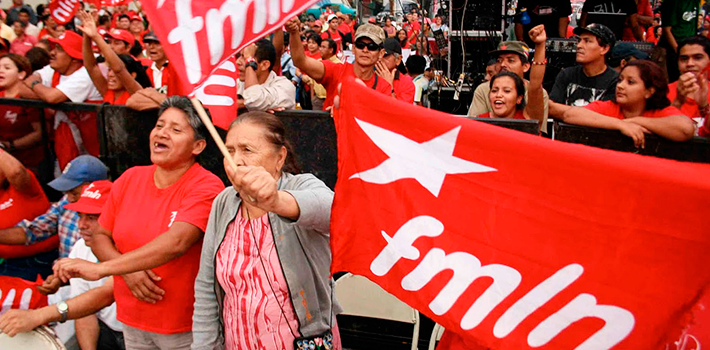EspañolLatin America has been increasingly experiencing a wave of victories that are without a doubt pushing towards collectivism and away from free-market capitalism on the political spectrum. This phenomenon has particular traits one has to be aware of in order to understand its causes, and one must consider both recent history and even developments that date back to the last century.

There are four particular tactics that can explain why collectivists, particularly those of the Bolivarian Alliance’s “21st Century Socialism” variety, have achieved the predominance they currently hold in the region:
- The proponents’ focus on winning incremental, baby-step battles rather than the overall “war” at once.
- Marxists have rebranded themselves as progressives, rather than radicals. They have come to terms with an allied, gradual increase of the state.
- They see and unite over each and every country as a battlefield; each electoral victory is important for the movement.
- They never let a good crisis go to waste.
With that said, it’s time to understand how capitalism can be saved according to the stated tactics.
Why is it important to focus on winning battles rather than immediately winning the war? The political agenda of the liberty movement is to limit government, but for successes to last, this has to be done in an incremental manner and with popular approval. Recognizing this challenging reality, liberty can’t only be about enforcing a “violent shift” into our ideal model.
Any reform that limits the state, therefore, is positive, while any reform that increases the state is negative. Considering that the status quo is predominantly statist, there is a broad path to travel — a path attributed to Nikita Khrushchev: ‘‘We can’t expect the American people to jump from capitalism to communism, but we can assist their elected leaders in giving them small doses of socialism, until they awaken one day to find that they have communism.”
The importance of this quote lies in the fact that unless societies are faced with a crisis (social, economic, and/or political), members will have a tendency to reject any radical shift. Hence, as the quote suggests, only by winning battle by battle will society embrace the overall winning of the war as a non-intimidating shift. As you can see, collectivists of various stripes have understood that well. One can see how the second aspect of being perceived as progressives rather than as radicals is why the left in times of peace and prosperity is still able of gaining in the political ground.

The reason I’m employing the term collectivist is because they — often known as leftists — have had a series of facades throughout modern history, even as “liberals” in the United States. These can be enclosed within such a term, in contrast to the individualism of capitalism. Leon Trotsky, one of the most radical of the Marxist collectivists, once stated: ‘‘It is the task of the regenerated Soviets to collaborate with the world revolution and the building of a socialist society.’’
And this raises the topic of being international and the importance it has had for the collectivists. In Latin America, for example, the infamous São Paulo Forum has proposed a recipe for how to shift a country to the “left.” Curiously enough, they have united both Trotskyites and the sponsors of 21st Century Socialism in this front. They have understood that only a regional brotherhood of statist political agents will effectively advance the cause, be that with a hardcore socialist emphasis or a more moderate approach, depending on the realities of the country in question.
Unfortunately, with the sole exception of academics, our various liberty movements have failed to do this successfully — at least in Latin America. (EsLibertad offers promise for the next generation.)
One can safely assume that collectivists are aware of the gradual walk towards socialism, with baby steps during times of peace and prosperity. However, this is not the case during times of crisis. As Chicago Mayor Rahm Emanuel, a former Obama-administration staffer, once said, ‘‘never let a good crisis go to waste.’’
Collectivists have successfully employed the Great Depression and the recent financial crisis towards their “make-work” or “stimulus” expansions of government. Consider the words attributed to Franklin D. Roosevelt: ‘‘but while they prate of economic laws, men and women are starving. We must lay hold of the fact that economic laws are not made by nature. They are made by human beings.’’
This is the basic trait of populists; during times of crisis, apparently members of society have no time to spare for rational thinking, such as that found in the field of economics. They are now open to radical shifts, and not surprisingly this attitude managed to allow Roosevelt to employ his infamous New Deal.
Recent times, given the Great Recession since 2008, have stoked the superficial proclaim that capitalism has finally proved a failure. During this period, the collectivist agenda has become somewhat more radical, and they have started to collect electoral victories. They never let a good crisis go to waste.

So how can capitalism be saved? By understanding the ways of the collectivists and statists who have succeeded against us. Focus on winning the political battles, even if one by one; portray capitalist ideals as the final but not immediate goals, particularly if the populace of your country may see individual freedom as too radical or foreign; be international in the political arena and form alliances towards liberty; if collectivists are in power and there are no signs of crisis, accept that the road to capitalism is traveled with baby steps; and finally, never let a good crisis go to waste.
 Versión Español
Versión Español












